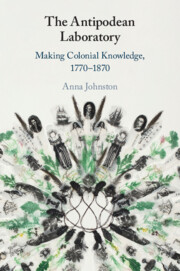Book contents
- The Antipodean Laboratory
- The Antipodean Laboratory
- Copyright page
- Dedication
- Contents
- Figures
- Acknowledgements
- Note on the Text
- Introduction
- Part I Imagining Settler Humanitarianism
- Part II Regulating Settler Society
- Part III Inventing Settler Science
- 5 Collecting Practices
- 6 Creating Colonial Readers and Imperial Networks
- Conclusion
- Bibliography
- Index
5 - Collecting Practices
Botany, Print Culture and Empire, 1768–1988
from Part III - Inventing Settler Science
Published online by Cambridge University Press: 21 September 2023
- The Antipodean Laboratory
- The Antipodean Laboratory
- Copyright page
- Dedication
- Contents
- Figures
- Acknowledgements
- Note on the Text
- Introduction
- Part I Imagining Settler Humanitarianism
- Part II Regulating Settler Society
- Part III Inventing Settler Science
- 5 Collecting Practices
- 6 Creating Colonial Readers and Imperial Networks
- Conclusion
- Bibliography
- Index
Summary
This chapter analyses colonial botanical collection to reveal the role of non-elite collectors and Indigenous interlocutors in providing knowledge that underpinned British science. The Endeavour brought the new taxonomy of Carl Linnaeus to the Southern Hemisphere. Joseph Banks, Daniel Solander and Sydney Parkinson recorded findings and took over 30,000 plants back to London, many of them viewed for the first time by Europeans swept up in the rage for botany. Knowledge production after James Cook’s first voyage was exponential, and it had both scientific and territorial consequences. New kinds of scientific writing also emerged from the controversial publication of Parkinson’s journal, and scientific bodies used innovative magazines to broaden access to and public support of science in the service of empire. Reliable collectors in the settler colonies worked with Indigenous collaborators to identify novel plant and animal materials, and send them to Britain. These included George Caley who worked with the Eora youth Daniel Moowaatin. The history of colonial science was informed by diverse participants, interests and motivations, and it changed how field work was conceived and scientific authority was established.
Keywords
- Type
- Chapter
- Information
- The Antipodean LaboratoryMaking Colonial Knowledge, 1770–1870, pp. 181 - 211Publisher: Cambridge University PressPrint publication year: 2023

